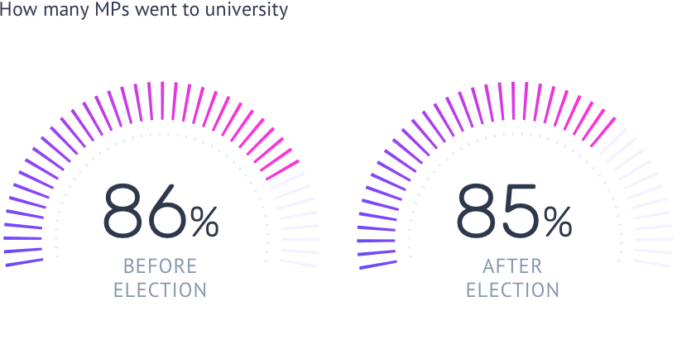You don’t need a degree to be an MP but 85% of ours currently do.
How many MPs attended university?
Our findings show the overall number of MPs who attended university has gone down slightly following the election. Before the election, 86% of MPs had gone to university, but this has now dropped to 85%. There are now 99 MPs who have not had a university education, showing you don’t have to be a graduate to gain a place in the House of Commons.
The number of MPs who didn’t go to university;
99 MPs (15%) who won seats in the 2019 election didn’t go to university
94 MPs (14%) before the most recent election didn’t go to university
Percentage of MPs who went to university;
85% of MPs elected in the 2019 general election attended University
vs
86% of MPs who held seats before the general election
Did more male or female MPs go to university?
Our study also found a smaller percentage of male MPs have been to university compared to female MPs. The gap between the two has narrowed however, with the percentage of female MPs who have attended university dropping from 90% to 86%, and the proportion of male MPs staying at 84%.
Percentage of male vs female MPs who went to university
2019 election winners
86% of females went to university
84% of males went to university
vs
MPs before the election
90% of females went to university
84% of males went to university
How many MPs went to Oxbridge?
Interestingly, although the number of MPs who have gone to university has dropped by just 1%, those who attended Oxbridge has dropped by 3%, from 22% to 19%. This shows that perhaps the supposed influence of Oxford and Cambridge graduates on UK politics is beginning to slip.
Percentage of MPs who went to Oxford or Cambridge;
19% of MPs elected in the 2019 General Election attended either Oxford or Cambridge University
vs
22% of MPs who held seats before the election attended either Oxford or Cambridge University
Which party has the most Oxbridge graduates?
Of the MPs that went to Oxbridge, it’s perhaps no shock to find that 70% represent the Conservative Party, up 12% from the previous government. Labour MPs make up the vast majority of the difference, representing 28%, with the other 2% coming from the Liberal Democrats. Although they now boast 48 seats, not one SNP MP attended either Oxford or Cambridge.
144 MPs with seats before the 2019 election went to Oxford or Cambridge
58% of those were Conservative MPs
33% of those were Labour MPs
0% of those were SNP MPs
2% of those were Lib Dem MPs
123 MPs who won seats in the 2019 election went to Oxford or Cambridge
70% of those were Conservative MPs
28% of those were Labour MPs
0% of those were SNP MPs
2% of those were Lib Dem MPs
Which universities are most popular with MPs?
When it comes to the most popular universities that MPs attend, the top 4 remains unchanged following the election. Oxford, Cambridge, London School of Economics and Manchester still lead the way for providing the most MPs. Further down the list Glasgow, Edinburgh and Durham keep their places in the top 10, but there are now places for Birmingham and Exeter, with Aberystwyth dropping out.
The most popular choice of university for MPs who won seats in the 2019 election were;
Oxford
Cambridge
London School of Economics
Manchester
Glasgow
Durham
Edinburgh
Exeter
Birmingham
Joint = Nottingham, Newcastle, Hull, Bristol
The most popular choice of university for MPs before the election were;
Oxford
Cambridge
London School of Economics
Manchester
Hull
Glasgow
Nottingham
Edinburgh
Durham
Aberystwyth
What subjects do MPs study?
If you dream of becoming an MP, but don’t know which subject to study to get there, then these findings may shed some light. The most popular degrees studied by MPs before and after the election have changed slightly, with the top six remaining politics, law, economics, history and philosophy. Only the order has changed, with history now the 2nd most popular subject after politics, and law and economics slipping one place each.
The most popular subjects for MPs who won seats in the Dec 2019 election
Politics – 20%
History – 13%
Law -12%
Economics – 10%
Philosophy – 6%
English – 4%
Laura Rettie, Vice President of Global Communications at Studee comments:
“It’s surprising to see there’s been a decrease in the number of MPs who went to university, especially because historically the perception of Conservative MPs has been different. The typical Conservative MP appears to be evolving.
There isn’t a precise recipe for election success, but our research demonstrates studying certain subjects at a handful of universities still has an overwhelming influence on your chances of becoming an MP.”







